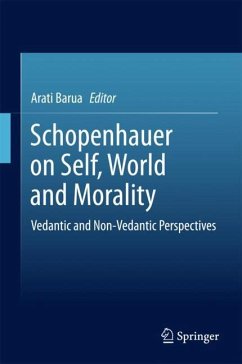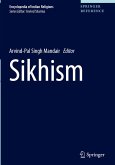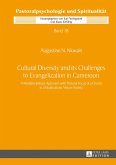Schopenhauer on Self, World and Morality
Vedantic and Non-Vedantic Perspectives
Herausgegeben:Barua, Arati
Schopenhauer on Self, World and Morality
Vedantic and Non-Vedantic Perspectives
Herausgegeben:Barua, Arati
- Gebundenes Buch
- Merkliste
- Auf die Merkliste
- Bewerten Bewerten
- Teilen
- Produkt teilen
- Produkterinnerung
- Produkterinnerung
This volume is a unique collection of philosophical essays on various aspects of Schopenhauer's understanding of the nature and character of the world through the classical philosophies of the Vedanta and Buddhism and classical and modern thinkers like Bhartrhari, Tagore, and Wittgenstein. It includes reflective insights about Schopenhauer and the metaphysics of the world, the self, and morality from scholars who have pioneered the philosophical study of the relation between Schopenhauer and Indian schools of thoughts and intellectual history. This insightful volume is a good academic resource…mehr
Andere Kunden interessierten sich auch für
![Sikhism Sikhism]() Sikhism224,99 €
Sikhism224,99 €![Cultural Diversity and its Challenges to Evangelization in Cameroon Cultural Diversity and its Challenges to Evangelization in Cameroon]() Augustine NkwainCultural Diversity and its Challenges to Evangelization in Cameroon71,80 €
Augustine NkwainCultural Diversity and its Challenges to Evangelization in Cameroon71,80 €![New Directions for Catholic Social and Political Research New Directions for Catholic Social and Political Research]() New Directions for Catholic Social and Political Research75,99 €
New Directions for Catholic Social and Political Research75,99 €![Art Cinema and Theology Art Cinema and Theology]() Justin PonderArt Cinema and Theology75,99 €
Justin PonderArt Cinema and Theology75,99 €![We Are the Leaders We Have Been Looking For We Are the Leaders We Have Been Looking For]() Eddie GlaudeWe Are the Leaders We Have Been Looking For19,99 €
Eddie GlaudeWe Are the Leaders We Have Been Looking For19,99 €![Kommunikation in Philosophie, Religion und Gesellschaft Kommunikation in Philosophie, Religion und Gesellschaft]() Kommunikation in Philosophie, Religion und Gesellschaft129,95 €
Kommunikation in Philosophie, Religion und Gesellschaft129,95 €![Performance of Identity of Polish Tatars Performance of Identity of Polish Tatars]() Barbara Pawlic-MiskiewiczPerformance of Identity of Polish Tatars63,45 €
Barbara Pawlic-MiskiewiczPerformance of Identity of Polish Tatars63,45 €-
-
-
This volume is a unique collection of philosophical essays on various aspects of Schopenhauer's understanding of the nature and character of the world through the classical philosophies of the Vedanta and Buddhism and classical and modern thinkers like Bhartrhari, Tagore, and Wittgenstein. It includes reflective insights about Schopenhauer and the metaphysics of the world, the self, and morality from scholars who have pioneered the philosophical study of the relation between Schopenhauer and Indian schools of thoughts and intellectual history. This insightful volume is a good academic resource for further research in comparative philosophy of Schopenhauer and the Indian tradition.
Produktdetails
- Produktdetails
- Verlag: Springer / Springer Nature Singapore / Springer, Berlin
- Artikelnr. des Verlages: 978-981-10-5953-7
- 1st ed. 2017
- Seitenzahl: 204
- Erscheinungstermin: 18. Januar 2018
- Englisch
- Abmessung: 241mm x 160mm x 17mm
- Gewicht: 466g
- ISBN-13: 9789811059537
- ISBN-10: 9811059535
- Artikelnr.: 48551750
- Herstellerkennzeichnung
- Springer-Verlag GmbH
- Tiergartenstr. 17
- 69121 Heidelberg
- ProductSafety@springernature.com
- Verlag: Springer / Springer Nature Singapore / Springer, Berlin
- Artikelnr. des Verlages: 978-981-10-5953-7
- 1st ed. 2017
- Seitenzahl: 204
- Erscheinungstermin: 18. Januar 2018
- Englisch
- Abmessung: 241mm x 160mm x 17mm
- Gewicht: 466g
- ISBN-13: 9789811059537
- ISBN-10: 9811059535
- Artikelnr.: 48551750
- Herstellerkennzeichnung
- Springer-Verlag GmbH
- Tiergartenstr. 17
- 69121 Heidelberg
- ProductSafety@springernature.com
Arati Barua is Associate Professor of Philosophy, Deshbandhu College, University of Delhi, and the Founder Director of the Indian division of the Schopenhauer Society (IDSS), under the International Schopenhauer Society in Germany. Besides being a member of various academic societies such as the Schopenhauer Gesellschaft, Germany, North American division of Schopenhauer Society (NADSS), USA and Indian Association for Canadian Studies (IACS), India, she is also a member of the Scientific Advisory Board of the Schopenhauer Jahrbuch, Germany. She was awarded a Faculty Research Fellowship by the Shastri Indo-Canadian Institute (SICI) to work on her project, "George Grant and M. K. Gandhi on technology and modernism", at the university of Guelph, Ontario. In 2006, she was awarded a Deutsche Forschungsgemeinschaft (DFG) fellowship by the German Research Foundation, Germany for her project on "Sankara and Schopenhauer: A comparative study", to work at the Schopenhauer Research Center,Johannes Gutenberg University, Mainz, Germany. She has published several books on Schopenhauer, and was recently conferred the prestigious national award "Bharat Excellence 2016", by the Friendship Forum of India (FFI) at New Delhi in recognition of excellence in her field of activity and enhancing the image of India. Dr Barua has also been awarded with "Bharat Jyoti Award 2015" and "Best Citizens of India 2015" by different institutions in India.
Chapter 1. Introducing Schopenhauer's Philosophy of the World, Self and Morality in the light of Vedantic and Non-Vedantic Wisdom Arati Barua.- Chapter 2. Some Remarks on the Present State of Research on Schopenhauer and Indian philosophy M. Kossler. Part I Schopenhauer, the Vedas and Vedantas. I.I Self, World and Morality.- Chapter 3. Self, World and Morality: Schopenhauer, Wittgenstein and Vedanta R. C. Pradhan.- Chapter 4. The Upanishadic Views on Self, World and Morality: An Assessment with Special Reference to Arthur Schopenhauer Jayantee Priyadarshini Sahoo.- Chapter 5. Schopenhauer's comments on morality in the Oupnek'hat Mitri Martina Kurbel. I.II Schopenhauer and the Vedas.- Chapter 6. The Quintessence of the Upanishadic Wisdom and the Solace of Schopenhauer's life K. M. Pathak.- Chapter 7. Reason, Emotion and Beyond: Revisiting Schopenhauer, Bhartrhari and Abhinavagupta Ajay Verma.- Chapter 8. Circumscribing the Meeting of Schopenhauer and the Vedas: Gaudapada, Sankara and Vedanta Manish Sharma. Part II Schopenhauer and Buddhism.- Chapter 9. Compassion and solidarity in Schopenhauer and the Upanishads Thomas Regehly.- Chapter 10 On the "Philosophy of Saintliness": K. E. Neumann's German Translations of the Buddha's Discourses and Schopenhauer's Philosophy Stephan Atzert.- Part III Schopenhauer and Tagore.- Chapter 11 Schopenhauer and Tagore on the " Vanity of existence": A parallel and comparative study S. Ray.- Chapter 12. Overcoming principium individuationis: Schopenhauer and Tagore Indu Sarin. Part IV Schopenhauer, Wittgenstein and Aurobindo.- Chapter 13. Journey from Pessimism to Optimism in Schopenhauer, Wittgenstein and Tagore's philosophy Bhaskar Bhattacaryya.- Chapter 14. Will to live or no-will to live? The points of convergence of the thoughts of Schopenhauer, Wittgenstein, and Aurobindo on living a meaningful life K. C. Pandey. Bibliography. Index.
Chapter 1. Introducing Schopenhauer's Philosophy of the World, Self and Morality in the light of Vedantic and Non-Vedantic Wisdom Arati Barua.- Chapter 2. Some Remarks on the Present State of Research on Schopenhauer and Indian philosophy M. Kossler. Part I Schopenhauer, the Vedas and Vedantas. I.I Self, World and Morality.- Chapter 3. Self, World and Morality: Schopenhauer, Wittgenstein and Vedanta R. C. Pradhan.- Chapter 4. The Upanishadic Views on Self, World and Morality: An Assessment with Special Reference to Arthur Schopenhauer Jayantee Priyadarshini Sahoo.- Chapter 5. Schopenhauer's comments on morality in the Oupnek'hat Mitri Martina Kurbel. I.II Schopenhauer and the Vedas.- Chapter 6. The Quintessence of the Upanishadic Wisdom and the Solace of Schopenhauer's life K. M. Pathak.- Chapter 7. Reason, Emotion and Beyond: Revisiting Schopenhauer, Bhartrhari and Abhinavagupta Ajay Verma.- Chapter 8. Circumscribing the Meeting of Schopenhauer and the Vedas: Gaudapada, Sankara and Vedanta Manish Sharma. Part II Schopenhauer and Buddhism.- Chapter 9. Compassion and solidarity in Schopenhauer and the Upanishads Thomas Regehly.- Chapter 10 On the "Philosophy of Saintliness": K. E. Neumann's German Translations of the Buddha's Discourses and Schopenhauer's Philosophy Stephan Atzert.- Part III Schopenhauer and Tagore.- Chapter 11 Schopenhauer and Tagore on the " Vanity of existence": A parallel and comparative study S. Ray.- Chapter 12. Overcoming principium individuationis: Schopenhauer and Tagore Indu Sarin. Part IV Schopenhauer, Wittgenstein and Aurobindo.- Chapter 13. Journey from Pessimism to Optimism in Schopenhauer, Wittgenstein and Tagore's philosophy Bhaskar Bhattacaryya.- Chapter 14. Will to live or no-will to live? The points of convergence of the thoughts of Schopenhauer, Wittgenstein, and Aurobindo on living a meaningful life K. C. Pandey. Bibliography. Index.








